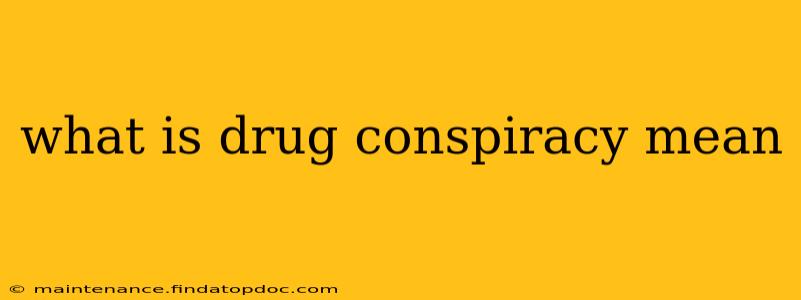Drug conspiracy, a serious federal crime, goes beyond simply possessing or selling drugs. It involves an agreement between two or more individuals to commit a drug-related offense. Understanding the nuances of this charge is crucial, as the penalties can be severe. This guide will delve into the definition, elements, and implications of drug conspiracy charges.
What Constitutes a Drug Conspiracy?
At its core, a drug conspiracy charge hinges on the agreement to commit a specific drug crime. This agreement doesn't require a formal contract or written document; it can be implied through actions, conversations, or even a tacit understanding between parties. The prosecution must prove the existence of this agreement and that the defendant knowingly participated in it. The key elements usually include:
- Agreement: A mutual understanding between two or more individuals to commit a drug-related crime. This agreement can be explicit or implicit.
- Overt Act: At least one conspirator must take a step towards furthering the conspiracy. This doesn't have to be the ultimate goal (e.g., selling drugs), but any action taken in furtherance of the agreement will suffice.
- Knowledge and Intent: The defendant must knowingly and intentionally participate in the conspiracy, understanding its illegal nature. Mere association with other individuals involved in drug activity is usually insufficient.
- Specific Drug Offense: The conspiracy must target a specific federal drug crime, such as distribution, manufacturing, or possession with intent to distribute a controlled substance.
It's crucial to understand that you can be charged with drug conspiracy even if you didn't directly participate in the actual drug transaction. Your involvement in the planning, facilitation, or support of the illegal activity can be sufficient to secure a conviction.
What are the Penalties for Drug Conspiracy?
The penalties for drug conspiracy are substantial and vary depending on several factors, including:
- Type of Drug: Conspiring to distribute more serious drugs like heroin or cocaine carries harsher penalties than conspiring to distribute less serious drugs.
- Quantity of Drugs: The amount of drugs involved directly impacts sentencing. Larger quantities generally result in longer sentences.
- Prior Convictions: A history of drug-related offenses will significantly increase the severity of the sentence.
- Role in the Conspiracy: Those who play a more significant role, such as the organizers or leaders, typically face more severe punishments.
Sentences can range from lengthy prison terms to significant fines, and even life imprisonment in severe cases.
What is the difference between drug trafficking and drug conspiracy?
Drug trafficking generally refers to the actual transportation, distribution, or sale of controlled substances. Drug conspiracy, on the other hand, focuses on the agreement to commit the trafficking. You can be charged with both drug trafficking and drug conspiracy if you are actively involved in the transportation and sale of drugs and have conspired with others to do so. The charges are often filed together.
Can I be charged with drug conspiracy even if I didn't know all the participants?
Yes, you can be charged with drug conspiracy even if you didn't know every member of the conspiracy. The prosecution only needs to prove that you knowingly participated in the agreement with at least one other person, and that your actions furthered the overall goal of the conspiracy.
What is the best defense against a drug conspiracy charge?
A successful defense often involves challenging the prosecution's proof of the key elements outlined above. This could involve demonstrating a lack of agreement, a lack of knowledge of the illegal activity, or a lack of intent to participate in the conspiracy. Expert legal counsel is crucial in building a robust defense strategy. The specific defense strategy will depend on the unique facts of the case.
This information is for educational purposes only and should not be considered legal advice. If you face drug conspiracy charges, it's imperative to seek the advice of a qualified criminal defense attorney immediately. They can explain your rights and help you navigate the complex legal process.
